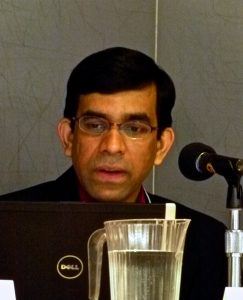
Just returned home from a truly inspiring event. Kaushik Sunder Rajan, anthropologist of biotech, author of Biocapital, gave a talk today on a series of human papillomavirus vaccine trials in India, during which seven of the young girls who served as subjects died.
In 2009, under the sponsorship of the Bill & Melinda Gates Foundation, an international NGO called the Program for Appropriate Technology in Health (PATH), administered HPV vaccine to thousands of girls in Gujarat and Andhra Pradesh. The drugs (from Merck and GlaxoSmithKline) had already been approved in the US and India. The trial was to establish if they were suitable for the Indian government’s mass immunization program.
In the tribal areas – the official designation for parts of the country populated by mostly indigenous people – seven girls died during the trial, bringing it to a scandal-ridden halt. The deaths were investigated and all were found ‘not linked to the vaccine.’ According to the report from PATH, there were two cases of malaria, two of organophosphorus poisoning (!), one fever of unknown origin, a snakebite, and one of the girls drowned in a well. It quickly emerged, however, that the informed consent procedures for the trial had been extremely lax, and PATH was denounced in the press. A highly critical report issued by the Indian Parliament in 2013 lamented the way that the NGO “had exploited with immunity the loopholes in our system…”
Sunder Rajan’s talk led us through a multi-layered analysis of the case, placing it in political and historical context, and probing its wider implications. He hovered over some fascinating moments, including parliamentary exchanges about the definition of a clinical trial and poignant testimony from the parents of the girl who supposedly died from a snakebite.
His overall critique was aimed at the technocratic nature of organizations such as PATH, self-described on its website as “an international nonprofit organization that transforms global health through innovation. PATH takes an entrepreneurial approach to developing and delivering high-impact, low-cost solutions, from lifesaving vaccines, drugs, diagnostics, and devices to collaborative programs with communities. Through work in more than 70 countries, PATH and our partners empower people to achieve their full potential.”
At the beginning of the talk, Sunder Rajan mused on the figure of the free-choosing subject that underpins informed consent. When I asked him about that in the Q&A, his answer took us back to the birthplace of technocratic liberalism, the first few decades of the nineteenth century, when the British state turned the Indian subcontinent into a laboratory of mass governance. In 1813, the Governor General of Calcutta, Sir William Bentinck, legalized the practice of ‘voluntary sati.’ In answering me, Sunder Rajan gave a sketch of the multi-layered ironies of that legacy as piercing as it was subtle. My British soul is slayed.